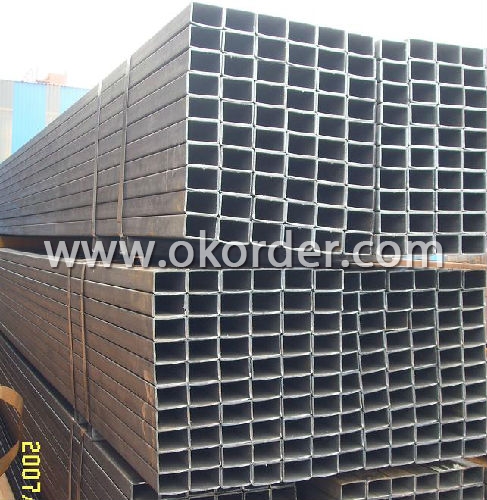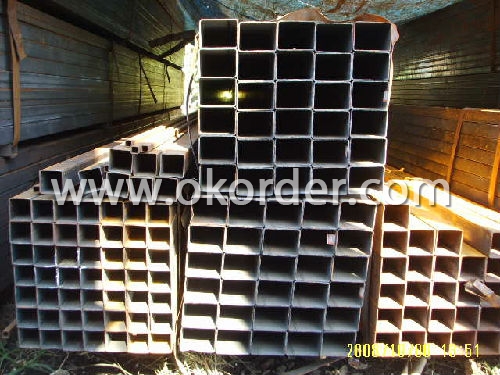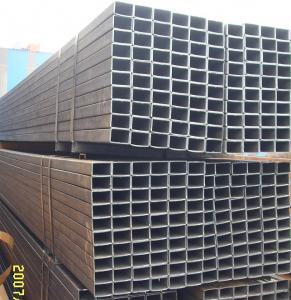Hollow Section Steel Tubes(Hot Rolled/Cold Rolled)
- Loading Port:
- China Main Port
- Payment Terms:
- TT or L/C
- Min Order Qty:
- 50MT m.t.
- Supply Capability:
- based on order m.t./month
OKorder Service Pledge
OKorder Financial Service
You Might Also Like
Hollow Section Steel Tubes(Hot Rolled/Cold Rolled)
Application of Hollow Section Steel Tubes(Hot Rolled/Cold Rolled)
It is widely used in building, machine, chemical equipment, automobile industrial, container, it is also applied to agriculture and mine machine.
ASTM A500, GB6728
Steel grade of Hollow Section Steel Tubes(Hot Rolled/Cold Rolled)
ASTM A500: A, B, C
GB6728:Q195,Q215,Q235,Q345
Size of Hollow Section Steel Tubes(Hot Rolled/Cold Rolled)
*Remark: Besides below sizes, we also can arrange production based on requirement of customers
Sizee(mm) | Thickness(mm) |
20×10 | 0.6-1.0 |
25×12 | 0.6-1.0 |
38×19 | 0.6-1.5 |
50×25 | 0.6-1.5 |
50×30 | 1.6-3.0 |
60×40 | 1.5-3.5 |
75×50 | 1.5-4.0 |
80×40 | 1.5-4.0 |
100×50 | 2.0-6.0 |
100×60 | 2.0-6.0 |
100×75 | 2.0-6.0 |
120×60 | 3.0-6.0 |
120×80 | 3.0-6.0 |
125×50 | 3.0-6.0 |
125×75 | 3.0-6.0 |
150×50 | 3.0-6.0 |
150×75 | 3.0-6.0 |
150×100 | 4.0-12 |
160×80 | 4.0-6.0 |
175×100 | 4.0-12 |
200×100 | 4.0-12 |
200×150 | 4.0-12 |
250×150 | 5.0-12 |
300×200 | 5.0-12 |
400×200 | 5.0-12 |
Chemical Composition(%)
Chemical Requirement | ||||
| Composition % | |||
Grade A | Grade B | |||
Heat | Product | Heat | Product | |
Element | analysis | analysis | analysis | analysis |
Carbon max | 0.26 | 0.3 | 0.22 | 0.26 |
Manganese max | … | … | 1.4 | 1.45 |
Phosphorus, max | 0.035 | 0.045 | 0.03 | 0.04 |
Sulfur max | 0.035 | 0.045 | 0.02 | 0.03 |
Copper, when copper steel is specified, min | 0.20 | 0.18 | 0.2 | 0.18 |
Where an ellipsis (...)appears in this table, there is no requirement | ||||
For each reduction of 0.01 percentage point below the specified maximum for carton, and increase of 0.06 percentage point above the specified maximum for manganese is permitted, up to a maximum of 1.50% by heat analysis and 1.6% by product analysis | ||||
Mechanical Properties
Tensile Requirement | ||
| Grade A | Grade B |
Tensile strength, min, psi (Mpa) | 48000 (400) | 70000 (483) |
Yield strength, min, psi (Mpa) | 36000 (250) | 50000 (345) |
Elongation in 2 in. (50.8mm), min, % | 23 | 23 |


- Q:What are the different sizes of steel pipes available?
- Steel pipes are available in a wide range of sizes, ranging from small diameters of around 0.5 inches to large diameters of up to 72 inches or more. The specific sizes of steel pipes vary depending on their intended use and application, with common sizes falling within the range of 1/8 inch to 36 inches in diameter.
- Q:What is the role of steel pipes in the chemical manufacturing industry?
- Steel pipes are an essential component in the chemical manufacturing industry as they are used for various purposes such as transporting chemicals, gases, and liquids safely and efficiently. They provide a durable and corrosion-resistant infrastructure, ensuring the integrity of the chemical processes. Steel pipes also play a crucial role in maintaining the overall safety and reliability of the manufacturing operations.
- Q:Are steel pipes suitable for desalination plants?
- Yes, steel pipes are suitable for desalination plants. Steel is a durable and corrosion-resistant material that can withstand the harsh conditions and high-pressure requirements of desalination processes. Additionally, steel pipes provide excellent flow characteristics and can be easily welded, making them a reliable choice for transporting and distributing saltwater in desalination plants.
- Q:Can steel pipes be used for wastewater treatment facilities?
- Yes, steel pipes can be used for wastewater treatment facilities. Steel pipes are commonly used in wastewater treatment plants due to their durability, resistance to corrosion, and ability to withstand high pressures and temperatures. They are suitable for transporting various types of wastewater, including industrial effluents and sewage, making them an ideal choice for such facilities.
- Q:How are steel pipes protected against microbial corrosion?
- Various methods are employed to safeguard steel pipes against microbial corrosion. One widely used technique entails applying coatings onto the surface of the pipes. These coatings act as a shield, effectively blocking the entry of microbes and their corrosive byproducts into the steel, thereby safeguarding it from degradation. Coatings like epoxy, polyethylene, and fusion bonded epoxy are frequently utilized to bestow this protection. Another method involves the use of corrosion inhibitors. These inhibitors are added to the fluid that flows through the pipes in order to impede microbial growth and prevent corrosion. They can be either organic or inorganic compounds that function by either eradicating the microbes or inhibiting their metabolic activity. Furthermore, ensuring proper maintenance and cleaning of the pipes is vital in preventing microbial corrosion. Regular inspections and cleaning routines aid in the elimination of any biofilms or microbial deposits that may have formed on the pipe's surface. This significantly reduces the likelihood of microbial corrosion and prolongs the lifespan of the pipes. In certain cases, cathodic protection may also be employed. This method entails utilizing sacrificial anodes or impressed current systems to supply a protective electrical current to the pipe. This current helps prevent the formation of corrosive microorganisms and shields the steel from corrosion. In summary, a combination of coatings, corrosion inhibitors, regular maintenance, and cathodic protection techniques are employed to protect steel pipes from microbial corrosion. By utilizing these strategies, the longevity and integrity of the pipes are ensured, benefiting various industries such as oil and gas, water supply, and sewage systems.
- Q:What is the difference between steel pipes and concrete-lined pipes?
- The main difference between steel pipes and concrete-lined pipes lies in their composition and protective features. Steel pipes are typically made entirely of steel, providing strength and durability. On the other hand, concrete-lined pipes consist of a steel pipe coated with a layer of concrete. This lining offers additional protection against corrosion and abrasion. While steel pipes are more suitable for high-pressure applications and offer better resistance to external factors, concrete-lined pipes are commonly used in wastewater systems to prevent corrosion and extend the lifespan of the pipe.
- Q:What are the specifications for steel pipes used in high-pressure applications?
- The specifications for steel pipes used in high-pressure applications typically include requirements for the pipe material, such as high strength and resistance to corrosion, as well as specific dimensions, thickness, and wall thickness to withstand the pressure. Additionally, they may need to meet specific industry standards, such as ASTM or ASME, and be tested for quality assurance, including pressure testing and non-destructive testing methods.
- Q:How do steel pipes resist corrosion?
- Steel pipes resist corrosion through a process called passivation, wherein a protective layer of oxide forms on the surface of the steel, preventing further oxidation and corrosion. Additionally, the pipes can be coated with anti-corrosive materials or undergo treatments such as galvanization or lining to enhance their resistance against corrosion.
- Q:How are steel pipes protected against soil movement?
- Steel pipes are protected against soil movement through various methods such as using casing pipes, employing anchor systems, implementing protective coatings, and utilizing concrete thrust blocks. These measures ensure that the steel pipes remain stable and secure in the event of soil movement.
- Q:What are the different types of steel pipe coatings for offshore applications?
- There are several types of steel pipe coatings that are commonly used for offshore applications. Some of the most common types include fusion bonded epoxy (FBE) coating, three-layer polyethylene (3LPE) coating, and three-layer polypropylene (3LPP) coating. FBE coating provides excellent corrosion resistance and is often used in subsea pipelines. 3LPE coating combines fusion bonded epoxy with an adhesive and a high-density polyethylene layer, offering superior mechanical protection and corrosion resistance. 3LPP coating, on the other hand, combines fusion bonded epoxy with an adhesive and a polypropylene layer, providing enhanced resistance to high temperatures and chemicals. These coatings help to protect steel pipes from corrosion, abrasion, and other environmental factors, ensuring their durability in offshore environments.
1. Manufacturer Overview |
|
|---|---|
| Location | Tianjin,China |
| Year Established | 2000 |
| Annual Output Value | Above Thirty Million RMB |
| Main Markets | China; Europe |
| Company Certifications | ISO9001:2000 |
2. Manufacturer Certificates |
|
|---|---|
| a) Certification Name | |
| Range | |
| Reference | |
| Validity Period | |
3. Manufacturer Capability |
|
|---|---|
| a)Trade Capacity | |
| Nearest Port | Tianjin;Qingdao |
| Export Percentage | 41% - 50% |
| No.of Employees in Trade Department | |
| Language Spoken: | English;Chinese |
| b)Factory Information | |
| Factory Size: | 53000square meter |
| No. of Production Lines | |
| Contract Manufacturing | OEM Service Offered;Design Service Offered |
| Product Price Range | Low Average |
Send your message to us
Hollow Section Steel Tubes(Hot Rolled/Cold Rolled)
- Loading Port:
- China Main Port
- Payment Terms:
- TT or L/C
- Min Order Qty:
- 50MT m.t.
- Supply Capability:
- based on order m.t./month
OKorder Service Pledge
OKorder Financial Service
Similar products
New products
Hot products
Related keywords































